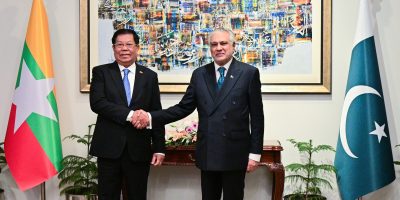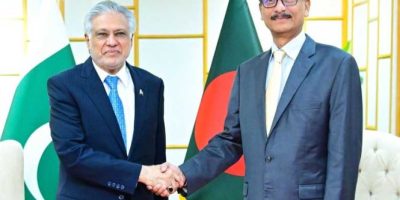Pakistan’s future growth hinges on a clear national direction: Veteran diplomats

ISLAMABAD, SEPT 20 (DNA) – Pakistan’s future growth is dependent on establishing a clear national direction that integrates positive nation-building efforts into every policy decision. This direction is crucial for resolving the country’s governance crisis, fostering ideological unity, and leveraging the nation’s untapped potential in emerging sectors like tourism and technology.
Additionally, Pakistan needs to adopt a unified, whole-of-nation approach in policy decisions and reforms to overcome the complex challenges accumulated over the past seven decades.
This was the central message delivered by senior former diplomats, Ambassador (r) Sardar Masood Khan, former president of AJK, and Ambassador (r) Masood Khalid during the annual meeting of National Advisory Council (NAC) of the Institute of Policy Studies (IPS), Islamabad. The forum was moderated by Ambassador (r) Syed Abrar Hussain, vice chairman IPS, and chaired by Khalid Rahman, chairman IPS. The yearly gathering aims to garner intellectual input from veteran practitioners for IPS’ research activities and realistic ideas regarding national issues.
Ambassador Masood Khalid highlighted Pakistan’s policy-making crisis, stressing that “policies made in silos” lead to weak coordination and ineffective implementation. He highlighted the absence of strategic clarity and the internal tension between reformists seeking change and those clinging to the status quo as major barriers to progress. According to him, this tug-of-war reflects a deeper crisis within Pakistan’s policy-making framework.
One such example is Pakistan’s approach to the China-Pakistan Economic Corridor (CPEC). While CPEC presents a unique window of opportunity, the lack of coherent, strategic policies jeopardizes its potential. He stressed that if not managed attentively and diligently, CPEC could become a missed opportunity, reflecting broader policy dysfunction. To capitalize on such opportunities, Pakistan must create an enabling environment that fosters ease of business, particularly for Chinese investments.
Ambassador Khalid urged civil society, especially the research community, to engage with political stakeholders more proactively. Such outreach, he noted, could help inform better policy decisions, ultimately leading to a more coordinated and effective governance system.
In his remarks, Ambassador Masood Khan focused on the ideological foundations of Pakistan, stressing that nation-building must be prioritized to strengthen national unity and identity. “As an ideological state, Pakistan must assert its core principles with confidence,” he stated. He warned of the growing ideological disunity among both the leadership and the general populace.
While drawing lessons from the global shift toward economic priorities, particularly in Muslim countries, Ambassador Khan argued that Pakistan must find a balance, learning from these trends while staying true to its ideological roots. He emphasized the need for developing indigenous infrastructure in literature, media, and law enforcement to better communicate and uphold national values.
Ambassador Khan also highlighted the dangers posed by negativity and information warfare, which he said contribute to strategic paralysis in the country. To counter these challenges, he called for a positive, forward-looking national direction that reasserts Pakistan’s core ideological values and emphasizes constructive nation-building.
Ambassador Abrar Hussain underscored the critical role of inclusive dialogue in addressing Pakistan’s pressing challenges. He endorsed the need for collective wisdom and a unified approach to bridge gaps in policy-making, urging closer collaboration between policymakers, researchers, and civil society to ensure more cohesive and strategic policy-making.
The diplomats agreed that the path forward requires not only clear national goals but also a robust communication strategy to convey Pakistan’s perspective on both domestic and international fronts.
Looking ahead to the opportunities of the digital age, they stressed the importance of technological advancement for Pakistan’s economic and diplomatic future. It was noted that Pakistan has the third-largest cohort of freelancers globally, representing a significant opportunity for growth. The speakers advocated for better policies and investments in technologies such as the Internet of Things (IoT), e-commerce, and generative AI, which could drive both economic and diplomatic success.
Related News

Pakistan and Myanmar Strengthen Bilateral Ties: Foreign Ministers Meet in Islamabad
ISLAMABAD, JAN 26 /DNA/: Deputy Prime Minister and Foreign Minister of Pakistan, Senator Muhammad IshaqRead More

Pakistan, Bangladesh resolve to bolster ties in various sectors
ISLAMABAD, JAN 25: Pakistan and Bangladesh have expressed their resolve to further strengthen ties acrossRead More


Comments are Closed